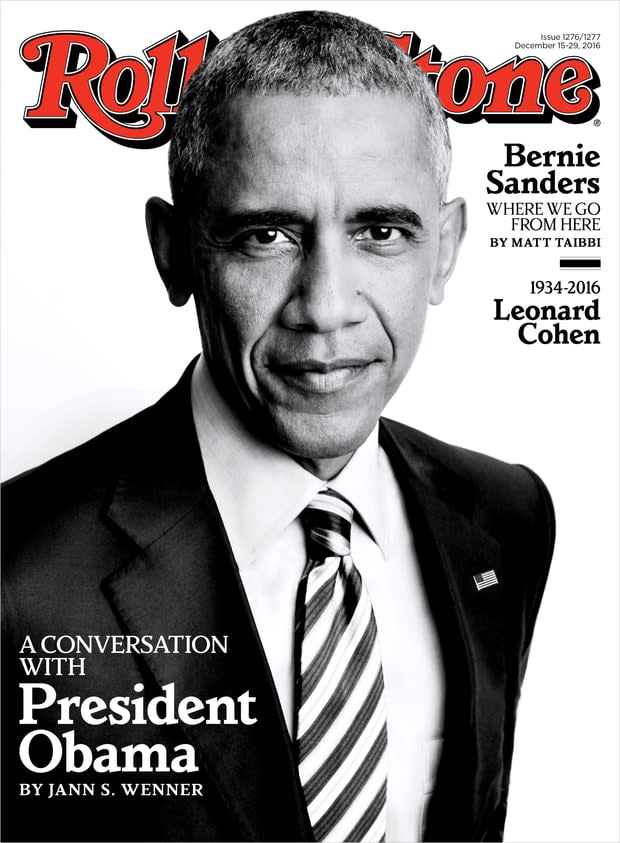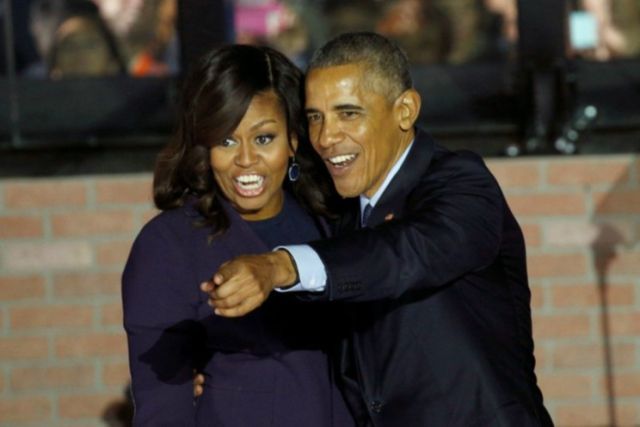President Obama says both he and first lady Michelle Obama will be “very active” in working with people at the grass-roots level to support progressive causes once he leaves office. But despite her popularity and natural public speaking ability, Michelle isn’t interested in a career in politics.
“Michelle will never run for office,” the president told Rolling Stone in an interview conducted the day after the election. “She is as talented a person as I know. You can see the incredible resonance she has with the American people. But I joke that she’s too sensible to want to be in politics.”
Obama says that after he hands the keys to the White House to President-elect Donald Trump, he plans to “sleep for a couple weeks” and take Michelle “on a well-deserved vacation.”
After that?
“I’ll spend time in my first year out of office writing a book, and I’m gonna be organizing my presidential center, which is gonna be focused on precisely this issue of how do we train and empower the next generation of leadership,” Obama said. “How do we rethink our storytelling, the messaging and the use of technology and digital media, so that we can make a persuasive case across the country?”
According to Obama, one of the biggest challenges he and his fellow Democrats face is figuring out how to recapture the white working class voters who voted for him — and didn’t vote for Hillary Clinton.
“I think that part of it has to do with our inability, our failure, to reach those voters effectively,” he said. “Part of it is Fox News in every bar and restaurant in big chunks of the country, but part of it is also Democrats not working at a grass-roots level, being in there, showing up, making arguments. That part of the critique of the Democratic Party is accurate. We spend a lot of time focused on international policy and national policy and less time being on the ground. And when we’re on the ground, we do well.”
Obama said the Midwestern voters who helped Trump win industrial states like Michigan and Wisconsin didn’t get the message that the Democratic Party has been working for them.
“This is not simply an economic issue. This is a cultural issue. And a communications issue. It is true that a lot of manufacturing has left or transformed itself because of automation. But during the course of my presidency, we added manufacturing jobs at historic rates,” Obama said. “You start reading folks saying, ‘Oh, you know, working-class families have been neglected,’ or ‘Working-class white families have not been paid attention to by Democrats.’ Actually, they have. What is true, though, is that whatever policy prescriptions that we’ve been proposing don’t reach, are not heard, by the folks in these communities. And what they do hear is ‘Obama or Hillary are trying to take away their guns’ or ‘they disrespect you.’”

More “face-to-face” time with white working class voters is needed, the president said.
“I think it is really important for us, as progressives — set aside the Democratic Party as an institution, but just anybody who wants to see a more progressive America — to think about how we are operating on the ground and showing up everywhere and fighting for the support of folks and giving them a concrete sense of what it is that we think will make their lives better,” Obama said, “rather than depending on coming up with the right technocratic policies and sharing that with the New York Times editorial board. If we are not on the ground, and people are not hearing and seeing us face-to-face, then we’ll keep on losing, even though I genuinely believe that the Republican prescriptions are not going to be as helpful to these folks.”
But Obama dismissed the idea that Trump’s election represents a “hard-right” turn among U.S. voters.
“If you survey the American people, including Trump voters, they’re in favor of a higher minimum wage,” he said. “They’re in favor, in large numbers, of decriminalizing marijuana. They, I think, are, increasingly and with shocking speed, accepting of the need to treat the LGBT community with respect. They are hugely suspicious of Wall Street, hugely suspicious of the Establishment. Part of what Trump did, as well as [Vermont Sen.] Bernie [Sanders], was run against that Establishment. Now the irony, of course, is that one would think Trump would be considered part of that Establishment and not a genuine outsider like Bernie was. So this doesn’t seem to be a moment in which there is a huge turn to the right.”
Obama also addressed the growing push to legalize marijuana.
“I’ve been very clear about my belief that we should try to discourage substance abuse,” Obama said. “And I am not somebody who believes that legalization is a panacea. But I do believe that treating this as a public-health issue, the same way we do with cigarettes or alcohol, is the much smarter way to deal with it.”
But removing pot from the list of Schedule I drugs is not something the president is willing to do himself.
“Typically how these classifications are changed are not done by presidential edict but are done either legislatively or through the [Drug Enforcement Agency],” Obama said. As you might imagine, the DEA, whose job it is historically to enforce drug laws, is not always going to be on the cutting edge about these issues.”
Still, Obama acknowledged that “it is untenable over the long term for the Justice Department or the DEA to be enforcing a patchwork of laws, where something that’s legal in one state could get you a 20-year prison sentence in another. So this is a debate that is now ripe, much in the same way that we ended up making progress on same-sex marriage.”















